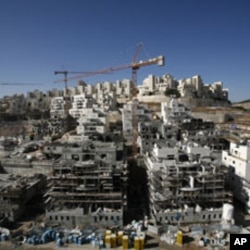The release of the so-called 'Palestine Papers' by the Doha-based Al Jazeera network has the major players in the Middle East conflict scrambling to assess their impact on future peace efforts.
Israel’s Foreign Minister Avigdor Lieberman says the documents show that in spite of concessions, Israeli negotiators could not reach an agreement with the Palestinians, and says only one solution remains - a long-term interim agreement.
The United States says that while the leaks complicate matters, the U.S. will redouble efforts to forge a peace deal. The Palestinians, while challenging the papers’ legitimacy, are looking for the silver lining in a cloud of embarrassment.
Saed Arikat is Washington bureau chief of the Palestinian newspaper Al Quds. He tells VOA’s Cecily Hilleary that the leaks say a great deal about the process of negotiating for peace in the Middle East.
Arikat: On the one hand, there was a great deal of flexibility on the Palestinian side, to the point where they can really stir a great deal of anger among the Palestinian public. They have been willing to compromise on issues that were thought out before and uncompromisable. Yet the Israelis were obviously quite intransigent, totally inflexible.
And on the one hand, it shows that the element of peace partnership that was alleged by both Israel and the U.S. in the past, as far as the Palestinians are concerned, was not the case. Quite the contrary. Israel was not a partner for peace. That’s on the one hand.
On the other hand, it shows how weak the Palestinians are and how really alone they are in terms of dealing with the State of Israel.
Hilleary: Let’s talk about some of the most damning revelations, at least to the Palestinian Authority. We hear that the Palestinian president [Mahmoud Abbas] was going to ask for the right of return of only about 100,000 refugees, refugees who actually number about five million. What’s the significance of this revelation?
Arikat: It’s quite significant. There are two issues for the Palestinians that are almost sacrilegious to tamper with Jerusalem and the refugees. You have to understand that the refugee issue had already been decided by the United Nations way back when the State of Israel was established.
The flip side of the establishment of the State of Israel is really to allow the Palestinians to return to their homeland. That has always been the case. That is concrete-clad. It’s not something that should be negotiated in principle. Whether the Palestinian refugees come back or do not come back, that’s a different thing altogether.
But to discard the principle of the right of the Palestinians to return to their homes, from which they’ve been uprooted, is to Palestinians sacrilegious. To say that we will accept a token number and to do away with the principle of the ‘right of return’ is unacceptable to the millions of Palestinians.
Hilleary: How realistic is it to imagine that five million people could be absorbed into either Israel or a new Palestine?
Arikat: I’m not a refugee expert, but I can tell you this: The issue of how do we absorb or how do we not absorb and all these things, that, as far as the Palestinians are concerned, is a non-issue. There is an incredible moral responsibility. There has been a tremendous tragedy levied upon the Palestinians. They have suffered a great deal as a result of the uprooting. They have languished in refugee camps for more than sixty years. So the issue of the refugees is far-reaching for the Palestinians.
As I said, whether they can be allowed back in or maybe compensated is not the issue. The principle should remain that these people have the right to return to their homes, in accordance with international law.
Hilleary: Let’s turn to the other big issue - Jerusalem. By the looks of the papers, the Palestinian president [Mahmoud Abbas] was offering to give up almost all of Arab East Jerusalem. What was Israel going to give up in return?
Arikat: Nothing. As a matter of fact, as it seems, the Palestinians negotiated, being as weak as they are, and that is really the most heart-wrenching, that they were negotiating all alone without any kind of support or international support or indeed, Arab or Muslim support.
The Israeli negotiator, Tzipi Livni [then Israeli Foreign Minister], as it seems, declared that the Palestinian concessions were not enough. The Palestinians had balked at conceding one major settlement, which is Har Homa [Jabal Abu Ghneim], that blocked their access to their portion of Jerusalem and Haram al Sharif [Temple Mount] and so on.
In other words, the whole premise of a Palestinian State - viable, contiguous, with Jerusalem as its capital, as agreed to in one U.N. resolution after another - was completely chucked out by the Israeli negotiators.
So now we can see that there has been, in many ways that [one], Israel is intransigent and will not allow the Palestinians a two-state solution, which they’ve touted for a long time; the Americans have been in many ways not an honest broker.
Their commitments and their words on the issues, be it the road map or going back to the Clinton points and so on, do not bring the actual weight in terms of being able to transform these words into deeds, and basically, they were satisfied with, in many ways, bullying the weaker among the negotiators, which is the Palestinians in thise case, while giving a hand up to the oppressor, that is how this issue is received. Not only among the Palestinians, but among the Palestinians and the Arab world.
Hilleary: So what next for Mahmoud Abbas? Can he recover from this blow, and who is waiting in the wings to step in if he does not?
Arikat: Well, for sure, this has been very damaging for Mahmoud Abbas, very damaging for the Palestinian negotiators. It shows how precipitous and panicky they were, unable to grasp what is happening. They were sort of crude in the world of negotiating. Negotiation has taken on a life of its own.
Whether he’s going to recover or not, I don’t know. I assume that Abbas will continue to be there, at least for the short term. [Saeb] Erikat will continue to be there, at least for the short term, as a negotiator. But indeed, this will strengthen the hand of Hamas and strengthen the hand of those who have been saying that there is no workable peace with Israeli because Israel is unwilling to reach a resolution where the Palestinians are recognized. Period.






